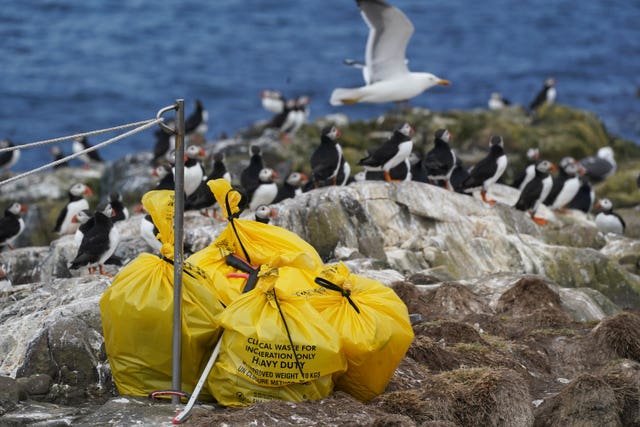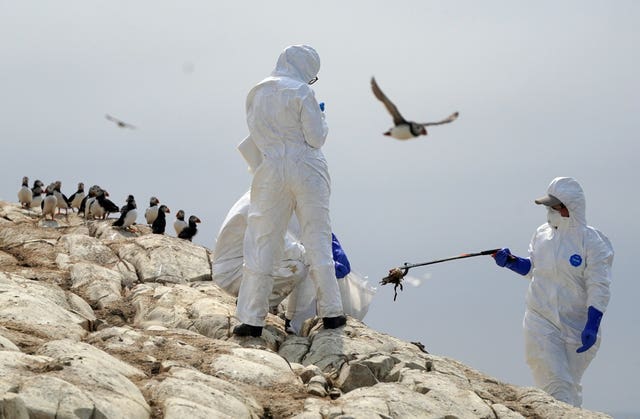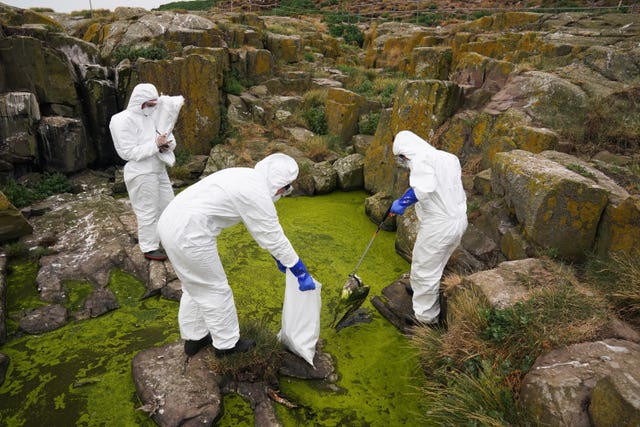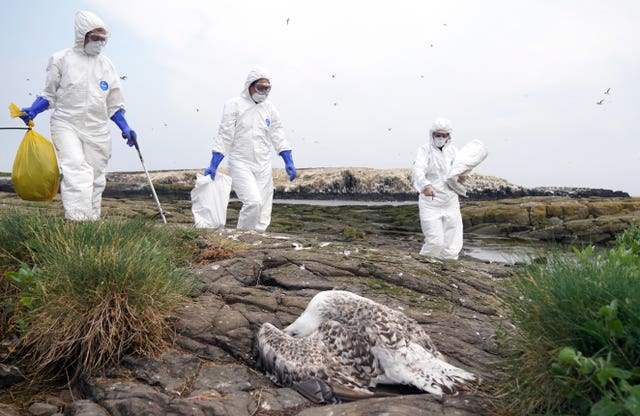
A bird flu outbreak on one of the UK’s most important habitats, which could potentially kill tens of thousands of seabirds, has been branded an “unprecedented wildlife tragedy”.
Rangers working on the Farne Islands off the Northumberland coast have donned protective suits and so far collected well over 3,000 dead birds for incineration.
But they fear that many thousands more have succumbed to the deadly disease and fallen off the cliffs into the North Sea.
The Farnes, which are looked after by the National Trust, are an internationally-important habitat for 23 species, including puffins, with 200,000 birds living there.
The virus is also widespread across Scotland, with positive cases recorded in Shetland, Orkney, Outer and Inner Hebrides, Highland, Moray, Aberdeenshire, Angus, Fife, East Lothian and Scottish Borders.
Seabird colonies at Noss, Hermaness, Hoy, St Kilda, Troup Head, Handa, Bass Rock and St Abbs have all been badly affected, and Scottish government agency NatureScot has advised against landings on 23 islands.
Cliff-nesting birds seemed to be the worst-affected by the bird flu outbreak, with guillemots, kittiwakes and young puffins known as pufflings among those recovered.
Rangers working for the trust have been removing their carcasses to prevent further contamination.
 (Owen Humphreys/PA)
(Owen Humphreys/PA)
For their own safety, they wore white hazmat suits, gloves and masks.
Some of the dead birds were ringed and the casualties include an eight-year-old Arctic tern which would have flown from the Farne Islands to Antarctica and back eight times during its lifetime, covering 144,000 miles.
Also discovered was a 16-year-old kittiwake which was ringed on the islands in 2006.
 (Owen Humphreys/PA)
(Owen Humphreys/PA)
Annually, 45,000 people take a trip to the Farnes but the islands were closed to visitors at the start of this month.
Farnes’ general manager Simon Lee said: “The welfare of our staff, volunteers and visitors is our top priority as we navigate this unprecedented wildlife tragedy on the islands.
“The National Trust has cared for the Farne Islands for just under 100 years, and there are no records of anything so potentially damaging to our already endangered seabird colonies.
 (Owen Humphreys/PA)
(Owen Humphreys/PA)
“The Farne Islands is a National Nature Reserve and home to approximately 200,000 seabirds, including guillemots, kittiwakes, razorbills and shags in addition to Arctic terns and puffins.
“We closed the islands to limit disturbance to the birds and are monitoring the situation daily.
“Our team of rangers are working hard to minimise the spread of the disease amongst the island’s precious wildlife.”
This strain of bird flu originated in east Asia and affected domestic flocks in the UK over the winter. It has since spread across the country to infect wild birds.
It spreads when birds come into direct contact with an infected bird, faeces, body fluids or indirectly via food and water.
 (Owen Humphreys/PA)
(Owen Humphreys/PA)
The risk to humans is considered to be very low and people are rarely affected.
The National Trust has called on the Government to act.
Ben McCarthy, the Trust’s head of nature conservation and restoration ecology, said: “This disease is undoing decades of hard work to restore nature and undermines the Government’s own targets to reverse the decline of our threatened species and improve their habitats.
“The scale of this disaster calls for an urgent National Response Plan for the virus in wild birds.
“We need a more co-ordinated approach to ensure effective monitoring, surveillance and reporting to support research into the impacts this deadly disease is having on our wild birds across the UK.”



Why are you making commenting on The Herald only available to subscribers?
It should have been a safe space for informed debate, somewhere for readers to discuss issues around the biggest stories of the day, but all too often the below the line comments on most websites have become bogged down by off-topic discussions and abuse.
heraldscotland.com is tackling this problem by allowing only subscribers to comment.
We are doing this to improve the experience for our loyal readers and we believe it will reduce the ability of trolls and troublemakers, who occasionally find their way onto our site, to abuse our journalists and readers. We also hope it will help the comments section fulfil its promise as a part of Scotland's conversation with itself.
We are lucky at The Herald. We are read by an informed, educated readership who can add their knowledge and insights to our stories.
That is invaluable.
We are making the subscriber-only change to support our valued readers, who tell us they don't want the site cluttered up with irrelevant comments, untruths and abuse.
In the past, the journalist’s job was to collect and distribute information to the audience. Technology means that readers can shape a discussion. We look forward to hearing from you on heraldscotland.com
Comments & Moderation
Readers’ comments: You are personally liable for the content of any comments you upload to this website, so please act responsibly. We do not pre-moderate or monitor readers’ comments appearing on our websites, but we do post-moderate in response to complaints we receive or otherwise when a potential problem comes to our attention. You can make a complaint by using the ‘report this post’ link . We may then apply our discretion under the user terms to amend or delete comments.
Post moderation is undertaken full-time 9am-6pm on weekdays, and on a part-time basis outwith those hours.
Read the rules hereLast Updated:
Report this comment Cancel